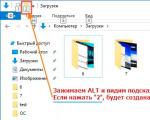Self-regulation calendar. The V International Conference “Technical Regulation in Construction” has completed its work 5th International Conference Technical Regulation in Construction
27.10.2017
The international conference “Technical regulation in construction” completed its work in Chelyabinsk
On October 25-26, 2017, the V International Conference “Technical Regulation in Construction” was held in Chelyabinsk. It was attended by representatives of the Ministry of Construction of Russia, FAU "Glavgosexpertiza of Russia", republican construction departments of Belarus, Kazakhstan, Kyrgyzstan, NOSTROY, NOPRIZ, representatives of the construction industry, self-regulatory organizations of the Ural Federal District.
The most important topics for discussion at the plenary session and round tables held during the conference were innovative approaches to regulation, design, examination and pricing, as well as new powers of SROs to monitor the activities of their members.
Opening the conference, Deputy Governor of the Chelyabinsk Region Sergei Shal emphasized: “We consider this event to be very important. Here questions are asked that define the basis of the construction industry. We must keep up with the times. The industry is changing. Builders can no longer work according to the standards they worked according to many years ago. Therefore, we are now trying to develop common rules of the game in this complex market.”
As Alexander Stepanov, Deputy Director of the Department of Urban Planning and Architecture of the Russian Ministry of Construction, said at the round table “Technical Regulation in Construction”, requirements for the design and construction of facilities will be subject to mandatory approval by the Russian Ministry of Construction. The corresponding bill, which provides for changes to Federal Law No. 384-FZ “Technical Regulations on the Safety of Buildings and Structures” and the Urban Planning Code of the Russian Federation, is planned to be submitted to the State Duma of the Russian Federation in the autumn session.
The creation of the Unified State Register of Expert Opinions has become one of the most important innovations in the Town Planning Code of the Russian Federation. The work of the registry, electronic services, standardization of expert activities and work with experts became the subject of discussion at the round table “From an electronic format of examination to a digital one,” moderated by the head of the Glavgosexpertiza of Russia, Igor Manylov.
Information modeling technologies as a modern tool for design, construction and operation were discussed at a round table, moderated by the head of the subcommittee of TC 465 “Construction” Yuri Zhuk.
One of the most numerous in terms of the number of participants was the round table “Practical aspects of SRO control over the fulfillment of obligations under construction contracts concluded using competitive contracting methods.”
Nikolay Khavka, Chief Specialist Legal Adviser of the Department of Regulatory and Methodological Support of the National Association of Builders Association, made a report on the functions of the SRO and other aspects when members of the SRO enter into construction contracts using competitive methods of concluding contracts. During the discussion, the participants exchanged their experience of working in new conditions gained since July 1, 2017, discussed the procedure for applying the risk-based approach, and also identified problematic issues that need to be addressed in the short term. Of particular interest was the topic of electronic interaction between interested parties involved in the process of concluding, executing and monitoring the execution of such contracts.
Later, at the round table “Conformity Assessment in Construction,” Nikolay Khavka made a report on the work of the National Association of Builders Association in the field of standardization, on the prospects for the development and implementation of uniform standards, including standards for the activities of self-regulatory organizations. The conference participants discussed issues of monitoring compliance with standards for work processes and reforms of control and supervisory activities.
The V International Conference “Technical Regulation in Construction” took place in Chelyabinsk on October 25–26, 2017. The head of the FAU “Glavgosexpertiza of Russia” Igor Manylov made a report “From the electronic format of examination to the digital one.” He informed that the Unified State Register of Expert Opinions will be launched on January 1, 2018, talking about the basic principles of its work and development prospects.
The V International Conference “Technical Regulation in Construction” took place in Chelyabinsk on October 25–26, 2017. It was attended by representatives of the Ministry of Construction of Russia, FAU "Glavgosexpertiza of Russia", republican construction departments of Belarus, Kazakhstan, Kyrgyzstan, NOPRIZ, NOSTROY, representatives of the construction industry and self-regulatory organizations of the Ural Federal District.
The meeting was opened by Deputy Governor of the Chelyabinsk Region Sergei Shal, who noted that the annual conference is in demand by participants in the construction sector of the economy of the Chelyabinsk Region, the Ural Federal District, Russia and the EAEU countries.
Deputy Director of the Department of Urban Development of the Ministry of Construction of Russia Alexander Stepanov made a report “Development of technical regulation in construction in the Russian Federation. Mechanisms for the functioning of the system of technical regulation and standardization in construction.” He also informed the audience about the results of the second meeting of the Basic Organization of the CIS member countries on technical regulation in construction in Almaty, where it was decided on the need to develop common approaches to technical standardization of the countries participating in the Basic Organization, to accelerate the harmonization of Russian and interstate classifiers as objects, as well as building materials, and requirements for these materials, taking into account their standard service life.
An analysis of the regulatory frameworks of the CIS member states was carried out, the purpose of which is to develop a unified approach to determining fundamental safety standards.
According to the Russian Ministry of Construction, first of all, it is necessary to develop four model interstate building codes.
Alexander Stepanov informed about the bill developed by the Ministry of Construction, which amends No. 384-FZ “Technical Regulations on the Safety of Buildings and Structures” and the Urban Planning Code of the Russian Federation. The bill provides for the introduction of new regulatory and technical documents - building codes of mandatory application and building rules - documents of voluntary application.
With the introduction of these changes, the need for a list of national standards and codes of rules (parts of such standards and codes of rules), as a result of which application on a mandatory basis ensures compliance with the requirements of Federal Law No. 384-FZ of December 30, 2009, is eliminated.
Changes are also envisaged in the procedure for developing documents for coordination and approval of regulatory and technical documents that ensure compliance with the requirements of Federal Law No. 384-FZ of December 30, 2009, for which a regulatory impact assessment procedure will be carried out similar to the procedure for adopting resolutions of the Government of the Russian Federation.
At the same time, he noted that the transition will be carried out gradually, within the framework of regular (at least once every 5 years) updating of the sets of rules provided for by current legislation. According to the speaker, the document has already been agreed upon with interested departments and finalized taking into account the comments of the Russian Government Office. It is planned to submit it for consideration to the State Duma in the fall.
Alexander Stepanov informed about the formation of a commission to create a federal register of regulatory documents in order to eliminate contradictions and duplication of requirements in the current regulatory and technical framework in construction, including documents regulating fire safety, sanitary standards and rules.
Changes to the legislation of the Russian Federation in the construction sector are being prepared, aimed at regulating the preparation of project documentation in electronic format, which will ensure the use of information modeling technologies. These materials have already been transferred to the Government of the Russian Federation.
The Ministry of Construction plans to create classifiers of capital construction projects, as well as building materials, products and structures, including standard service life and operation.
It is envisaged to carry out research work and develop regulatory and technical documents, which should contain standard service life and operating conditions, as well as a list of works and services necessary for the operation of capital construction projects.
It is planned to supplement existing documents, including in the field of pricing, information on the service life of objects and materials; expansion of the federal state information system for pricing in construction (FSIS CS) by supplementing it with terms of use and operating conditions of the facility at all stages of the life cycle.
The head of the FAU “Glavgosexpertiza of Russia” Igor Manylov made a report “From the electronic format of examination to the digital one.”
He informed that the Unified State Register of Expert Opinions will be launched on January 1, 2018, talking about the basic principles of its work and development prospects.
On the basis of the GIS "USRZ" it is also planned to collect data on analogous projects, which in the future will also help to use and fill the register of cost-effective reuse project documentation.
It is expected that there will be a gradual transition to the resource-based method of determining the cost of construction, as the system will begin to be filled in 2018 through quarterly monitoring.
Igor Manylov emphasized the need to move to a two-stage design by introducing a pre-design stage and developing an investment justification, abandoning regulatory control and moving to the economic efficiency of the project.
Minister of Construction and Infrastructure of the Chelyabinsk Region Viktor Tupikin reported on the strategic directions for the development of the construction industry in the region.
Director of RUE "Stroytekhnorm", Chairman of MTK 540 "Building Materials and Products" Igor Lishai spoke on the topic of modern policy, problems and prospects in the field of technical regulation in the construction industry of the Republic of Belarus and spoke about the mandatory confirmation of the conformity of building materials, products and work in the Republic.
Deputy Chairman of the Committee for Construction and Housing and Communal Services of the Republic of Kazakhstan Almaz Idyrysov highlighted issues of international cooperation in the field of technical regulation in construction in the Russian Federation and the Republic of Kazakhstan.
It was proposed to create a separate basic organization of the CIS member countries on issues of earthquake-resistant construction.
He noted that at the moment a new seismic zoning map has been developed in Kazakhstan, a declarative procedure for putting the facility into operation and joint responsibility of all construction participants are in effect.
Marina Velikanova, Director of the Department of Legal Regulation and Methodological Support of the NOPRIZ Apparatus, delivered a welcoming speech on behalf of NOPRIZ President Mikhail Posokhin. In the message of the President of NOPRIZ to the conference participants, it was noted that for the National Association of Prospectors and Designers the topic of technical regulation is key, and the practice of interaction between the professional community and authorities leads to positive results.
Vice-President of the Russian Union of Builders (RUC) for work in the Ural Federal District, Alexander Abaimov, informed about the participation of professional associations in improving regulatory and technical documents in construction, as well as the results of interaction between the professional community and the leadership of the Chelyabinsk region in the field of construction.
Legal Adviser of the Department of Regulatory and Methodological Support of the Association "National Association of Builders" Nikolai Khavka made a report on the work of NOSTROY in the field of standardization, prospects for the development and implementation of uniform standards, including standards for the activities of self-regulatory organizations.
The participants noted the relevance and need for regular holding of this conference, thanking the Government of the Chelyabinsk Region for their support in organizing it.
Based on the results of the conference, a resolution was adopted with decisions aimed at improving the system of technical regulation in construction.
The international conference “Technical regulation in construction” took place in Chelyabinsk
On October 25-26, 2017, the V International Conference “Technical Regulation in Construction” was held in Chelyabinsk. It was attended by representatives of the Ministry of Construction of Russia, FAU "Glavgosexpertiza of Russia", republican construction departments of Belarus, Kazakhstan, Kyrgyzstan, NOSTROY, NOPRIZ, representatives of the construction industry, self-regulatory organizations of the Ural Federal District.
The most important topics for discussion at the plenary session and round tables held during the conference were innovative approaches to regulation, design, examination and pricing, as well as new powers of SROs to monitor the activities of their members.
Opening the conference, Deputy Governor of the Chelyabinsk Region Sergei Shal emphasized: “We consider this event to be very important. Here questions are asked that define the basis of the construction industry. We must keep up with the times. The industry is changing. Builders can no longer work according to the standards they worked according to many years ago. Therefore, we are now trying to develop common rules of the game in this complex market.”
As Alexander Stepanov, Deputy Director of the Department of Urban Planning and Architecture of the Russian Ministry of Construction, said at the round table “Technical Regulation in Construction”, requirements for the design and construction of facilities will be subject to mandatory approval by the Russian Ministry of Construction. The corresponding bill, which provides for changes to Federal Law No. 384-FZ “Technical Regulations on the Safety of Buildings and Structures” and the Urban Planning Code of the Russian Federation, is planned to be submitted to the State Duma of the Russian Federation in the autumn session.
The creation of the Unified State Register of Expert Opinions has become one of the most important innovations in the Town Planning Code of the Russian Federation. The work of the registry, electronic services, standardization of expert activities and work with experts became the subject of discussion at the round table “From an electronic format of examination to a digital one,” moderated by the head of the Glavgosexpertiza of Russia, Igor Manylov.
Information modeling technologies as a modern tool for design, construction and operation were discussed at a round table, moderated by the head of the subcommittee of TC 465 “Construction” Yuri Zhuk.
One of the most numerous in terms of the number of participants was the round table “Practical aspects of SRO control over the fulfillment of obligations under construction contracts concluded using competitive contracting methods.”
Nikolay Khavka, Chief Specialist Legal Adviser of the Department of Regulatory and Methodological Support of the National Association of Builders Association, made a report on the functions of the SRO and other aspects when members of the SRO enter into construction contracts using competitive methods of concluding contracts. During the discussion, the participants exchanged their experience of working in new conditions gained since July 1, 2017, discussed the procedure for applying the risk-based approach, and also identified problematic issues that need to be addressed in the short term. Of particular interest was the topic of electronic interaction between interested parties involved in the process of concluding, executing and monitoring the execution of such contracts.
Later, at the round table “Conformity Assessment in Construction,” Nikolay Khavka made a report on the work of the National Association of Builders Association in the field of standardization, on the prospects for the development and implementation of uniform standards, including standards for the activities of self-regulatory organizations. The conference participants discussed issues of monitoring compliance with standards for work processes and reforms of control and supervisory activities.




